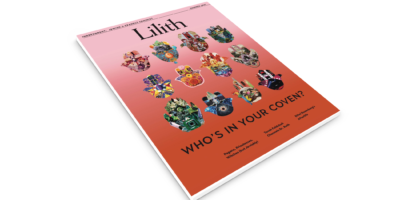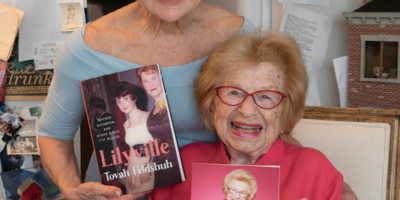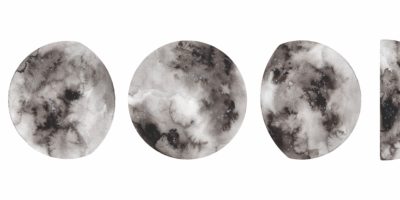
The Holiness of the In-Between
My gender identity sits in the space between the curved line and the finite dot of a question mark. In this gap between things that are written and things that are known is where I live.
I didn’t come out as a person who exists in the blank in-between space until very recently, though I’ve known this is who I am for a long time. Judaism is a tradition that values the written word. We ritually read, debate, argue over and analyze texts written in holy ink. I was afraid there was no place for someone like me in a tradition that values the written and the known.
But in college I was lucky enough to find myself among a group of Jews who also inhabited the in-between. They knew that to be Jewish is to be constantly evolving. They understood that LGBTQ+ people too are made b’tzelem Elohim, in the image of G!d. The members of this community didn’t just comprehend these ideals intellectually but they embodied them in their lives. Their Judaism was colorful and unconventional, yet full of meaning and intentionality. My queer Jewish community taught me that I can be all parts of myself at once, without contradiction.
And so, early in my sophomore year of college, when I came out as nonbinary, I felt I needed this connection in writing, and I felt the need to create a sacred moment for myself. In a culminating moment of my ongoing journey, the rabbi on my campus—Rabbi Nikki DeBlosi—and I together wrote a Tekes Maavar, a ceremony of transition. On the 28th of Sivan in 5780 on the Jewish calendar, surrounded by loved ones and members of my Jewish community, I ritually changed my name to one that is more gender-affirming.
The Tekes Maavar was one of the most beautiful moments of my life. It took place during Havdalah, which marks the shift between Shabbat and the week. The ceremony honoring my in-between took place at an in-between time.
My memory of the evening is hazy, but I know that every second of the ritual seemed more meaningful than the last. As I tried to describe this to a mentor of mine, a rabbinical student, she told me that feelings are sometimes meant to be just felt, and not labeled.
On that evening, I stood in front of loved ones and shared the story behind my chosen name. And though usually I love public speaking, my hands shook in anticipation.
I remember that the room felt especially warm, packed with people, and filled with love. The ceremony included a moment to acknowledge periods of transition for all in attendance. One person excitedly told us they were graduating soon. Another smiled as she said she was planning to convert. Others continued to share, and we held these moments of joy, emotion, and apprehension together. Collectively, we recited the Hebrew blessing over a rainbow: my university’s Jewish community had taught me that rainbow people are deserving of celebration.
The final few minutes of the Tekes Maavar are the most vivid in my memory. As the ritual drew to a close, I started sweating nervously. Rabbi Nikki wrapped me in her tallit, her prayer shawl, and I closed my eyes. She carefully recited the priestly blessing (considered one of the oldest and most powerful blessings in Jewish tradition) and I looked up into the faces of the people in my community. I beamed widely as she declared to me and the world that I was officially Noa. I finally felt like me.
Jewish texts usually think of holiness as a moment of distinction, of separation. We ritually separate childhood from adulthood, Shabbat from the week, one year from the next. I’ve come to think that there is something especially holy in the distinct uniqueness of the in-between. I felt holiness in that room on that Saturday evening. I try to feel it every day, with every breath as I live in this new name.
My new name, the name I have chosen for myself, means movement in Hebrew. With this, I hope to be reminded to be unafraid of change and growth. I hope to show others that yes, the in-between space can be scary, but the sweetness of authenticity is worth the struggle.
It has taken me a long time, but I know now that I am not a mistake. I believe the Universe doesn’t make mistakes. If we didn’t have space between letters, the page would be entirely dark. I am not merely allowed on the pages of the history of my people. I am a necessary component.
—
Noa Baron (they/them) is currently an undergraduate student at New York University studying Hebrew and Judaic Studies and Public Policy. They are passionate about activism and Judaism, and they dream about someday becoming a rabbi.




